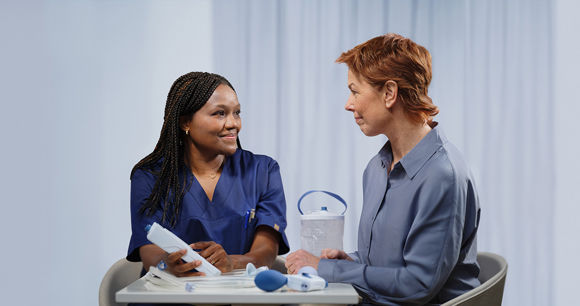
Low Anterior Resection Syndrome - Symptoms, Causes & Treatment
Low Anterior Resection Syndrome – LARS – is a constellation of symptoms or problems you may experience in varying degrees, after rectal cancer. Rectal function will never be exactly like it was before the surgery, but most people will achieve an acceptable function. Wellspect offers several product solutions to manage the symptoms you may experience and get you back in control following rectal surgery. We have assembled information on this page to help you find the methods that work best for you.
LARS Treatments
There are several treatment options, from simple to more advanced, that can be used either alone or in combination:
- counseling
- dietary advice
- medication
- emptying techniques
- toilet exercises
- pelvic muscle training
- transanal irrigation (TAI)
- assistive devices
- peripheral tibial nerve stimulation (PTNS) and sacral nerve stimulation (SNS)
The treatment must be tailored and adapted to your needs. Talk to your healthcare practitioner about your symptoms. There is help to get.
Transanal Irrigation (TAI)
Transanal irrigation (TAI) is a method of effectively emptying a larger part of the bowel, by introducing lukewarm water into the rectum. The water can stimulate the peristaltic movements of the bowels which helps to effectively empty the bowel. With Navina Systems there is always a choice to find a solution that fits your needs following rectal surgery. The therapy has been shown to be effective in 8 out of 10 patients with major LARS (Cura Pales, et al., 2019; Enriquez-Navascues et al., 2019)
No More Bowel Accidents
Starting with TAI is no quick fix and will require commitment and patience from you. When the training period is over and your bowel has adapted to the method, the aim is often to irrigate every other day and be continent in-between. The purpose of TAI is to restore a regular and well-functioning bowel, allowing you to lead a more normal life and get in control. Talk to your healthcare provider about Navina Systems.
-
What is Bowel Irrigation or TAI?
Treatment with bowel irrigation, sometimes also called transanal irrigation (TAI), is an option when other treatments like medications, diet changes and fluids have not helped.

-
Treatment for Bowel Problems
There are several ways to treat bowel dysfunction. These include surgical methods, transanal irrigation and conservative methods - such as lifestyle and diet.

-
Living with Bowel Problems
Here we explore our best tips and tricks for anyone starting their bowel care journey.
